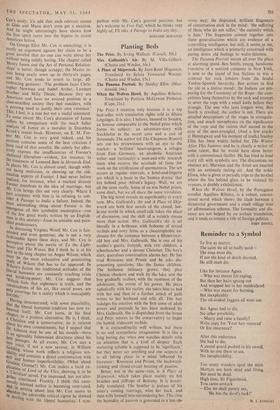Planting Beds
A Place of Shipwreck. By Jean-Rene Huguenin. Translated by Sylvia Townsend Warner. (Chatto and Windus, 15s.) When the Wolves Howl. By Aquilino Ribeiro. Translated by Patricia McGowan Pinheiro. (Cape, 21s.) The Prize I mention only because it is a top best-seller with translation rights sold in fifteen languages. It is also, I believe, banned in Sweden, an honour comparable to the Nobel prize which forms its subject: an adventure-story with Stockholm as the secret cove and a cast of thousands. The author (of The Chapman Report) sets out his prizewinners with an eye to the market: a 'brilliant' heart-surgeon, a refugee from East Germany, an alcoholic American writer and (seriously) a man-and-wife research team who receive the accolade of fame for work on the vitrification of spermatozoa. The sex occurs at regular intervals, a hotel-and-lingerie sex which is a basic in the 'human drama' that lies behind poor Alfred's legacy. Well, we are all the same really. Some of us win Nobel prizes, some don't, but we all share the same trivialities.
The big novel reveals its superficiality at every turn. Mrs. Galbraith's Air and A Place of Ship- wreck are both first novels of the closed, hot- house world in which small-talk takes the place of discussion, and the shift of a wrinkle means more than action. Mrs. Galbraith's Air is set literally in a hothouse with festoons of sexual orchids and oozy ferns as a claustrophobic en- closure for the romance between a fifteen-year- old boy and Mrs. Galbraith. She is one of his mother's guests, fortyish, with two children, a schoolteacher and a devout Christian. The boy's alert, querulous conversation alarms her. He has read Rousseau and Proust and he asks dis- concerting questions, like the James children. The hothouse intimacy grows; they play Chinese checkers and walk by the lake, and the boy gradually realises, with the nastiness of the adolescent, the extent of his power. He plays sadistically with his victim; she takes him to bed with her and then in a further attack- of guilt writes to her husband and tells all. The boy indulges his emotion with the first sense of adult power and pretends he has been molested by Mrs. Galbraith. She is dispatched from the house and Peter returns to the conservatory to finger the humid, iridescent orchids.
It is extraordinarily well written, but there is no real sympathetic imagination. It is like a long boring day when one watches details with an attention that is a kind of despair Each stuttering syllable is supposed to be 'significant,' but they never say anything and one suspects it is all taking place in a mind inflamed by literature: Rousseau and Proust, the backward- looking and closed-circuit buzzing of passion.
Better, but in the same •vein, is A Place of Shipwreck, which takes place mainly on hot beaches and clifftops of Brittany. It is beauti- fully translated. The brother is jealous of his sister's coming marriage, wins her back, and then wills himself into surrendering her. This time the humidity of passion is generated in a less ob- vious way; the disjointed, brilliant fragments of conversation stick in the mind: 'the suffering of those who do not suffer,' the curiosity which is hate.' The fragments cement together into these generalisations which are evidence of a controlling intelligence, but still, it seems to me, an intelligence which is primarily concerned with paring down old feelings to wafer-thinness.
The Panama Portrait moves all over the place at alarming speed. Ben Smith, young, handsome executive of a seafood company in New York, is sent to the island of San Stefano to win a contract for rock lobsters from the feudal Yankee-Spanish hierarchy. Ben arrives to find the isle in a festive mood: the Indians are pre- paring for the Ceremony of the Rope—the com- petitors hang themselves by the neck and attempt. to sever the rope with a small knife before they strangle. The one who lasts longest wins. Ben Smith is revolted; the author is not. There are detailed descriptions of the stages in strangula- tion, and much metaphysics on the significance of the rope and the visions that ascend to the eyes of the near-strangled. (And a few cracks' at Hemingway and his moment of truth.) Stanley Ellin has been widely hailed for The Winter After This Summer and he is clearly a writer of some talent. But he would have done better with a conventional thriller. He has tried to load every rift with symbolic ore. The discussions on abstract art, Marxism and the Artist are inserted with an anxiously testing air. And the noble Ehssa, who is given to periodic trips to the brothel where she lies behind glass to be violated by voyeurs, is doubly exhibitionist.
When the Wolves Howl, by the Portugnese novelist Aquilino Ribeiro, is a robust, conven- tional novel which shows the clash between a dictatorial government and a small village over an afforestation scheme. The formality and dis- tance are not helped by an archaic translation, and it tends to remain a tale of foreign politics.
JOHN DANIEL


































 Previous page
Previous page